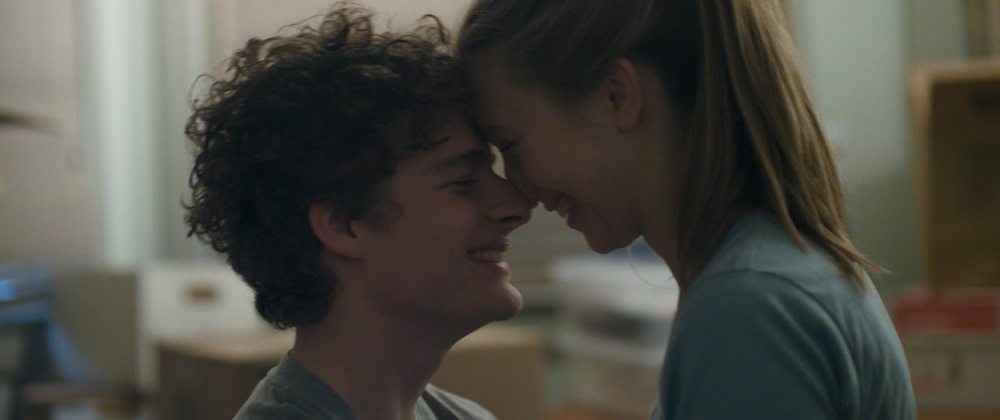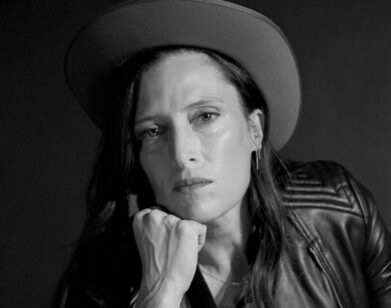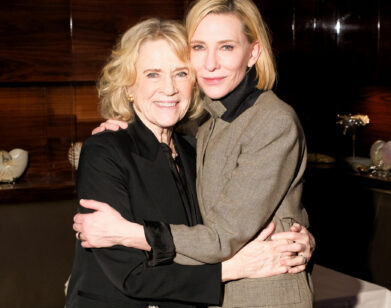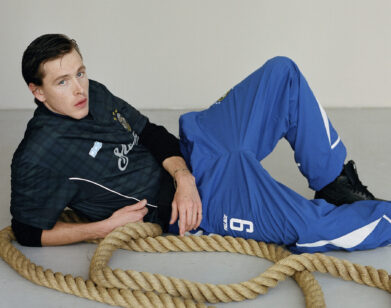The End of the Affair
Mel (Taissa Farmiga) and Dan (Ben Rosenfield) have been dating for six years, since Mel was 14 and Dan was 15. They are each other’s best friend and family: they grew up next door to each other in Houston, Texas; they lost their virginity to one another. When it came time for college, Mel followed Dan to University of Texas in Austin without question. As Dan’s graduation date approaches, however, their perfect relationship begins to show cracks. Mel gets nervous and clings harder to Dan, who oscillates between pushing her away and telling her how much he loves her. Their mutual supportiveness disintegrates into draining codependence and physical violence.
Written and directed by Hannah Fidell (A Teacher), and produced by Mark Duplass, 6 Years debuted at the SXSW Film Festival over the weekend and was promptly purchased by Netflix for approximately $1 million. Comparisons to Drake Doremus‘s cult Sundance hit Like Crazy are inevitable—both films are largely improvised (Farmiga and Rosenfield worked off an extensive outline complete with visual references of Urban Outfitters) and focus on young love-turned-toxic, and Rosenfield bears a striking resemblance to Like Crazy‘s Anton Yelchin—but 6 Years is still painful and intimate in its own right.
EMMA BROWN: What made you want to tell this story of a young romance gone wrong?
HANNAH FIDELL: Mark Duplass called me up and said that he wanted to do a young adult-type movie that dealt with an abusive relationship and I’ve always wanted to do something set in college—right at the end of college is such a particularly frustrating time. Also I wanted to subvert the kind of abusive relationship story that is seen fairly often, where it’s the stronger guy overpowering the girl. I thought it would be interesting to set that in a world that seems so familiar and make it relatable and make people question what abuse is. That was the genesis of it.
BROWN: Was Mel and Dan’s relationship always abusive?
FIDELL: No, I think that it evolved that way. Certainly when one person in a relationship starts feeling insecure about it, that’s when problems start to arise, and I think that’s really what the root of these issues are, that insecurity.
BROWN: Did Mark just call you out of the blue? Did he tell you that he’d seen A Teacher and was a big fan or something along those lines?
FIDELL: We both have the same agent and he had given me advice a few months before on how to pitch television shows, because at that time I was pitching a TV version of A Teacher. This was a little bit out of the blue, but he let me have free-reign completely on where the story was going to go. His only parameter was that it’s a young couple and they’ve known each other for a while and the relationship is going sour. He’s incredible to work with because he gives his directors free-reign.
BROWN: 6 Years took 18 days to film and about the same amount of time to write.
FIDELL: Yeah, it came very easily. I don’t know why, but I knew these characters. Not necessarily because of my own personal experience, but I knew the world and that really helped.
BROWN: Was that the case with A Teacher?
FIDELL: No, A Teacher took quite a while—it took many more months and required quite a bit of research. Also, this one wasn’t fully scripted. I want to say that our outline was about 40 pages long. I’d never really done anything so improv-based.
BROWN: People often talk about the benefits of improv—how it keeps the dialogue fresh—but were there moments where you were like, “I just wish we had a script!”
FIDELL: [laughs] I didn’t ever feel that way on set. Shooting went so smoothly. Where I did feel the effects of shooting in this improv style was in the edit. We wrapped shooting in the middle of April and we were still editing a month ago. It took a while. It’s hard putting the pieces together. You know the obvious structure of the film, but when it’s two cameras and there’s improv in one take that might be better than in another take and the actors aren’t necessarily having marks to hit—that was a learning process for me.
BROWN: How much input did Taissa [Farmiga] and Ben [Rosenfield] have into their characters? Were they pretty firmly established when you gave them the outline?
FIDELL: We really developed their characters together, both one-on-one and then individually as well. When we were shooting, both of them at times would say, “What if we tried it this way?” And I was incredibly open to that because at a certain point, the film—and especially a film like this—takes on a life of its own. They’re very much the authors of their characters, I just provided a framework and helped them find their way a bit. I’m still so impressed, every time I watch the movie, by how good they are. It was like that on set. We knew when we were shooting, all the crew was just like, “Oh my god, these two are so incredible! They have such great chemistry.”
BROWN: Was there any one scene that you really liked and wanted to keep in, but that just didn’t fit with the rest of the film?
FIDELL: Yeah, there was. Ben is a musician and he came to me one morning when we were shooting very nervously and said, “I wrote this song last night, and what if we did a scene like this?” And the scene was him playing a song about growing older for Mel and then Mel just kind of sits there and doesn’t get it and she’s like, “I’m trying to study can you just be quiet for a bit?” I loved that scene so much but unfortunately, because it wasn’t in the outline, and we kind of did it on the fly, it didn’t have a good place in the film. But I think it will be good for the DVD extras.
BROWN: When you were 21 and in your senior year of college, what did you think you were going to do when you graduated?
FIDELL: I wanted to make films, but I was a realist about it in that I knew how slim the chances were of actually being able to make a profession out of it. So I was thinking about grad school and then I ended up going, not in film, but in media theory.
BROWN: What did you want to be when you were five years old?
FIDELL: I used to dress up as a journalist. My mom is a journalist. I would wear this little business suit that I had, and I would carry around a tape recorder that had a microphone attached and I would ask people questions. [laughs]
BROWN: Oh wow.
FIDELL: I know. [laughs]
BROWN: Was your mother disappointed when you decided you wanted to work in film instead?
FIDELL: No, not at all. My mom, she wrote for The New York Times—she still does at times. She covered the Supreme Court, so she’s quite a legal scholar and my dad’s a lawyer—basically everyone in my family are lawyers. At one point, I thought that I actually wanted to go into entertainment law. My mom refuses to acknowledge that she said this, but she sat me down and told me that I would not make a very good lawyer and that I should do something in the arts. This was in high school. She really pushed me to go to art school for college and I rebelled by going to the biggest state school that I could possibly go to, which was Indiana University, and somehow I still ended up in the arts. She was right, as usual. [laughs]
BROWN: You said that you discovered Ben and Taissa through Boardwalk Empire and American Horror Story. Peter Vack has a small but significant role in 6 Years, how did you discover him?
FIDELL: Peter was recommended to me by our mutual agent. When we met, he was just finishing up a short that premiered at SXSW, which was excellent, and we became buddies and then he actually starred in this short that I made as prep for 6 Years. Will Brittain, who played the boy in A Teacher, was supposed to play the character that Peter played in 6 Years, but he had to drop out at the very last minute, so Peter thankfully stepped it. And I think his character and the way that he played it worked a lot better than the way that it would have come across if Will had played it, because Will is kind of fratty and bro-y and Peter is, to me, a more sensitive soul. Even though I know he comes off as fairly creepy in 6 Years, I think it’s less scary with Peter in that role then it would have been with Will.
BROWN: Do you think that because Peter is less overtly intimidating, it makes the role more frightening? You wouldn’t expect that sort of behavior from someone who seems sensitive.
FIDELL: Yeah, potentially. Initially Mark didn’t want that to be the event that brings [Dan and Mel] back together, but from both my own experiences in college, and especially with the epidemic—it’s been happening forever—of rape on college campuses, I thought that it would be interesting and true to play that angle. Peter and I had talked very extensively of how she had to be the one to invite him into her bed, and I didn’t want him to be necessarily the aggressor—that classic rapist that you imagine in your head—because that’s never how it happens. So I think Peter did a remarkable job with a very nuanced performance that comes off as quite terrifying because of how true it is on college campuses.
6 YEARS IS CURRENTLY SCREENING AT SXSW IN AUSTIN, TEXAS.







